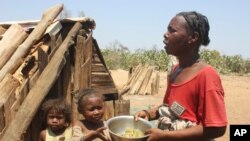The U.N. World Food Program warns five years of recurrent drought and the COVID-19 pandemic have brought southern Madagascar to its knees, with hundreds of thousands of its inhabitants struggling to find enough food to eat.
Lack of rain and poor harvests have left more than one-third of southern Madagascar’s population short of food, not knowing from where their next meal will come.
The World Food Program says 1.3 million people are going hungry, nearly double what it was in the same period last year.
Lola Castro is WFP regional director for southern Africa and Indian Ocean states. Speaking on a video link from Johannesburg, she says the drought and lockdown triggered by the COVID-19 pandemic have caused seasonal employment to dry up.
Every year between April and November, she says people in the region seek work in the cities and fields in rural areas. She says the population depends on the earnings from this casual labor. However, this year, she says there were no jobs because of the drought and COVID-19 lockdown.
“The rains that normally come November-December, we only had only one day of rain in December in the whole region," said Castro. "And, the thunderstorms have been blasting the region, have been blasting and destroying and burying the crops that were there. So, basically, what is the result? The result is famine-like conditions.”
The result she says is a looming humanitarian crisis. She says 1.3 million people in Madagascar are short of food and facing starvation. She says more than 135,000 children under five are suffering from severe or acute malnutrition.
“What are we seeing? Children have abandoned their schools. Seventy-five percent of the children in this area are either begging or foraging for food," said Castro. "The people are eating whatever they can find. Eating cactus mixed with mud, fruits, whatever they can find. Leaves, seeds, whatever is available.”
The World Food Program is providing food aid to nearly a half-million people in the nine hardest hit districts in southern Madagascar. The WFP says it would like to scale up its assistance program to reach almost 900,000 of the most vulnerable by June.
However, that depends on funding. Currently, the agency says it is running a deficit and urgently needs $35 million to provide lifesaving food, badly-needed cash and malnutrition treatment programs to the many in desperate need.




